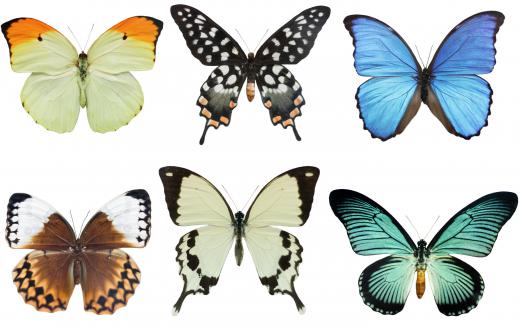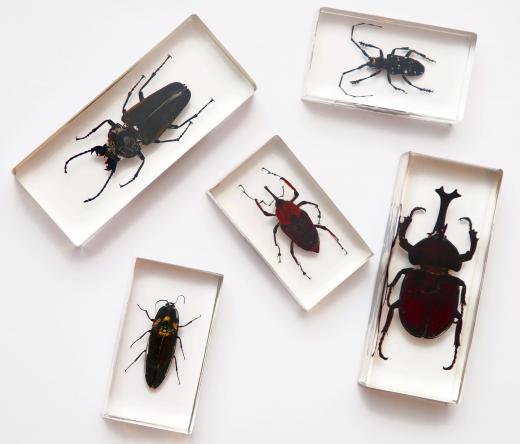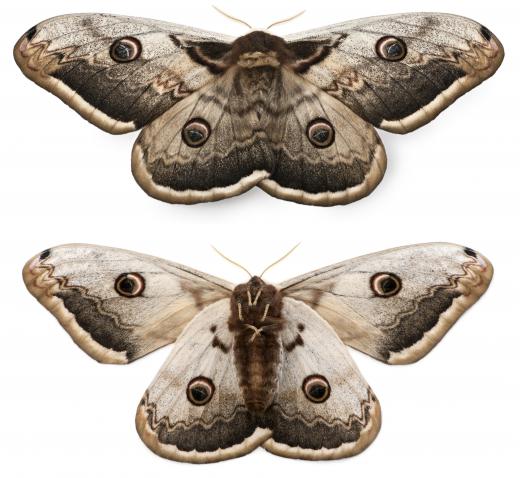What is an Entomologist?
 Mary McMahon
Mary McMahon
An entomologist is a zoologist who focuses specifically on the study of insects. Given that the insect world is vast and incredibly diverse, most people in this field focus on a specific order or family of insects. Careers in entomology are incredibly varied, ranging from forensic entomology to agricultural entomology. Numerous colleges and universities around the world offer training in entomology to people who are interested in this field of study.
Entomology is a very old science. Humans have had an interest in the insect world for centuries, thanks to agricultural pests and home invaders of the insect variety. Early entomologists probably learned to identify potential crop pests and to treat infestations of unwanted insects, and entomology was even involved in forensics at a fairly early state in human history. Many prominent scientists including Charles Darwin and E.O. Wilson also studied insects.

There are a number of branches within entomology. Entomologists may look at insect behavior, morphology, nutrition, and ecology. They can also study the ways in which insects interact with other animals and agricultural sites; such a person might look at insect vectors of disease in humans, for example, or the impact of locusts on crops in the Middle East. Entomologists are also active in fields like paleontology, learning about the evolution of insects, and in forensics, using insects as tools to learn more about victims of crimes.

The study of entomology can provide interesting clues into the history of life on Earth, and it can also be used to make projections about the future. Entomologists can participate in a wide range of projects, ranging from genetically engineering insects which attack crop pests to looking at the role that insects play in the life cycles of many plants.

An entomologist who focuses on butterflies is known as lepidopterist, while one who studies bees is called an apiologist. A coleopterist studies beetles, while myrmecologists look at ants. There are several other broad fields like these within the study of entomology, and a person may choose to focus on a specific subset of a field, like honeybees or dung beetles.

If you are interested in a career as an entomologist, you should start by getting a strong grounding in the sciences. If there is a particular subfield of entomology which interests you, try to get training in this field. Some accept interns, for example, while schools which offer entomology tend to have several programs with specific focuses available. Typically, entomologists attend both undergraduate and graduate institutions, and many of them pursue post-doctoral work as well. This field is incredibly vast and interesting, and you are unlikely to be bored as an entomologist.
AS FEATURED ON:
AS FEATURED ON:


















Discussion Comments
New Mexico State University has a humorous animated video online that defines "what is an entomologist" (a biologist with a job).
@bagley79 -- I agree that honeybees are very fascinating insects. I remember reading there has been more written about the honeybees than any other insect. That shows both how fascinating and how important they are.
Our state went for several years without a paid state apiarist. We have had one for about five years now after going many years without one. I know many states don't have a position like this, so am glad I live in a state that supports this type of research.
My husband and I have some honeybee hives so we are interested in the study of honeybees. We got involved with this shortly after the colony collapse disorder became so common. This is such a strange phenomenon, as one day you have what appears to be a very healthy hive, and the next day it has totally disappeared.
You would think if the hive was sick or distressed that you would see dead bees, but the whole hive has just vanished. This has been a huge challenge for those who raise honeybees for a living.
We only have a few hives so this does not affect our livelihood. I now understand why the study of honeybees is so important. The honeybees are in some way responsible for one third of the food we eat. That is really huge when you stop and think about it.
I think there is currently a lot more research money being spent on what is happening with these insects. Hopefully they will come up with some answers soon.
When I was in college my zoology professor was fascinated with butterflies. I don't know if he was an official lepidopterist or not, but much of his free time was involved in the study and research of butterflies.
Because he was so passionate about this field, he talked about butterflies a lot in his classes. This was the first time I had seen someone so passionate about insects. His enthusiasm was somewhat contagious, and I have more of an interest in butterflies because of this professor.
If I was going to devote my life to studying insects, I can't think of a better one to research. They are fascinating and beautiful creatures that we can learn more from than I ever realized.
@anon293248 -- It seems like I remember learning that spiders are not insects, but are considered arachnids. They are related, but not the same. I don't like bugs and can't imagine anyone spending their life studying them.
I had no idea that Charles Darwin was an entomologist. I am thankful there are people who are interested in this field, but I usually like to get rid of any insects I see inside my house.
Do entomologists study spiders?
Entomology is vital in understanding how certain diseases such as West Nile Virus, are transmitted via insects, as well as how certain repellents can work to prevent bites and stings. This is one big reason that there is always a demand for researchers in this intricate field of study.
Entomology is a branch of arthropodology, along with the other branches of arachnology, carcinology, and myriapodology.
Post your comments